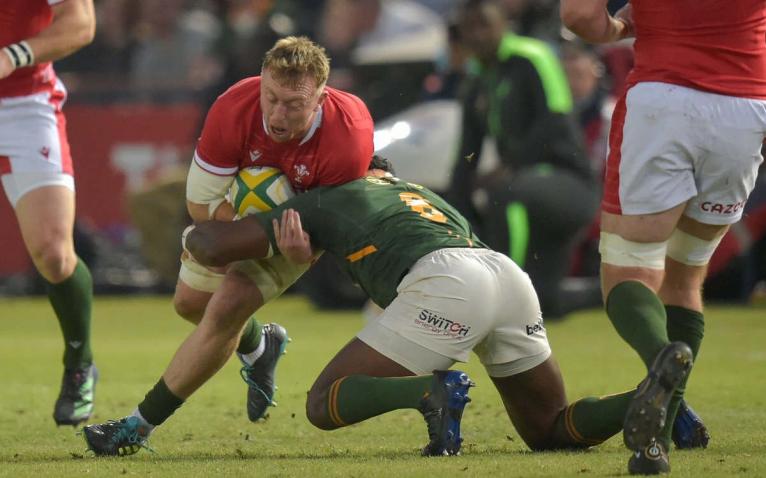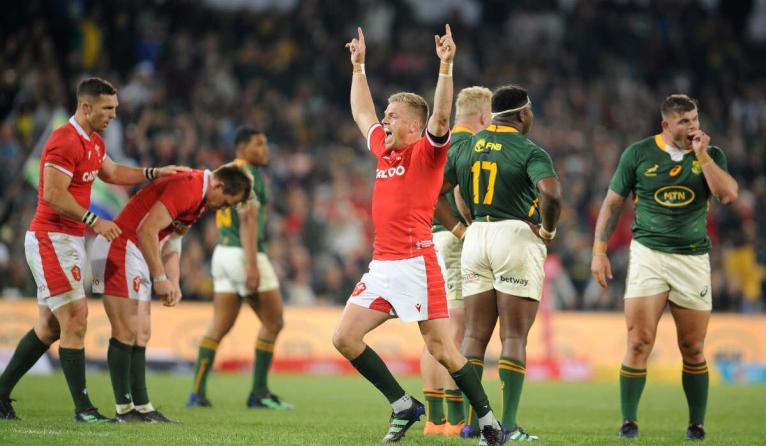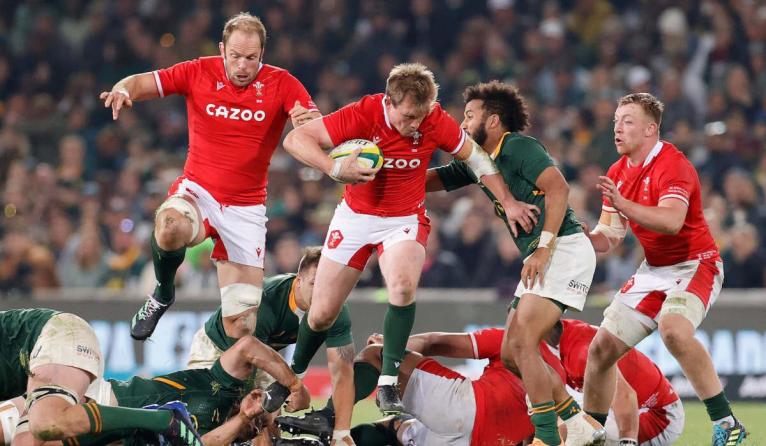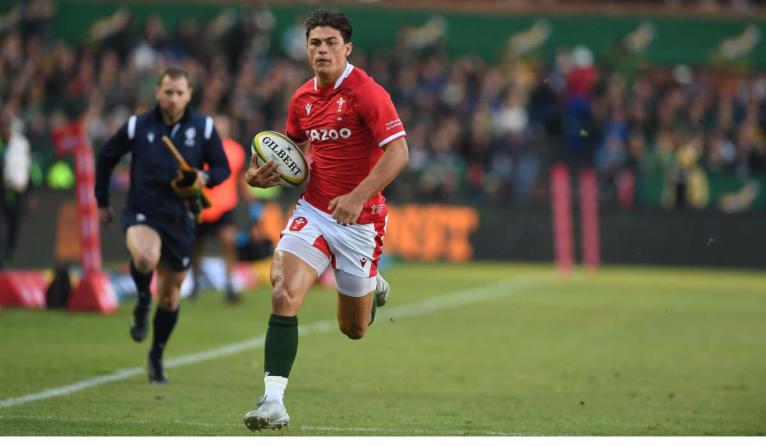During the aftermath of Wales’ historic victory over South Africa in Bloemfontein, I found myself sharing a bottle of Stellenbosch’s finest with several red-shirted supporters in a hotel bar. Having marvelled at Tommy Reffell’s man-of-the-match performance, I was busy waxing lyrical about his contribution to a husband-and-wife who seemed as impressed as I was.
Warming to my theme, I began making comparisons to the Warburton-Lydiate axis of yore. Lydiate, the “silent ninja” scything opponents down, Warburton, the arch-poacher, taking advantage of their disorientation to steal the ball from their grasp. Ten years on from those halcyon days when Lydiate and Warburton ruled the roost in 2012, Lydiate was back at it; defying the passage of time to deliver a performance of such destructive brutality it knocked the wind clean out of the World Champions. Fulfilling the “Warburton” role this time, was a 23-year-old from Pencoed by the name of Tommy Reffell. Already known as “Tommy Turnover” to the Leicester faithful, Reffell showed he could do what he does week-in week-out in the English Premiership, in the more rarefied atmosphere of test rugby.
As I recalled how critical his two breakdown turnovers had been, I was corrected – politely – by the man I was speaking to. “He had four, actually”, he said. “Wow, he was really paying attention”, I thought to myself, when another Welsh supporter leaned in and whispered, “you know that’s Tommy’s Dad, don’t you?” The husband-and-wife, it turned out, were Mr and Mrs Reffell. The loveliest and proudest couple you’d care to meet.

During a tour in which Wales created history by winning on South African soil for the first time ever, Reffell emerged with an enormous amount of credit. His selection ahead of Josh Navidi for the first test raised eyebrows, but it proved an inspiration. A week after his man of the match triumph, he scored Wales’ only try in the deciding test in Cape Town. It wasn’t enough to secure a coveted series victory, but it was confirmation of his test quality. Being at Leicester has meant he’s had to bide his time while other, Wales-based 7s have been preferred. But now he’s had the opportunity, the other contenders will have to wrestle that shirt off his back. So highly rated is he in the East Midlands, that England had made several overtures hoping the former Wales U20s captain might switch allegiance. It was never on the cards.
Wainwright had never started a Premiership game for Saracens. That’s the equivalent of a singer-songwriter playing an open mic night at the Cob & Pen in Rhyl one weekend, and headlining Glastonbury’s Pyramid Stage the next.
Another to have emerged with credit is Sam Wainwright, the tattooed, mulletted North Walian who went head-to-head with the mighty Boks front row, and refused to take a backwards step. Prior to running out into the hostile atmosphere of Bloemfntein’s Toyota Stadium, he’d never started a Premiership game for Saracens. Allow that to sink in. That’s the equivalent of a singer-songwriter playing an open mic night at the Cob & Pen in Rhyl one weekend, and headlining Glastonbury’s Pyramid Stage the next. Locking horns with the Springboks front row up on the high veldt in front of a 50,000 strong crowd baying for blood is something you build towards, not something you do while still an apprentice.
As the match hung in the balance with minutes on the clock, a scrum was called. Wainwright stared into the eyes of his vaunted opposite number, Steven Kitshoff, held his nerve, held his shape, and refused to buckle. Wales held on to secure the win and rewrote the history books. It wasn’t enough to get him a seat in Business Class on the flight home though; Wainwright was one of the unfortunate few who had to squeeze his rump into an economy seat with the rest of us, with the flight packed to the gills.
So two debutants, two success stories. Wayne Pivac has developed a habit of wrongfooting the press corps with his leftfield selections, but again his eye for a rough diamond has proved sharp. He’s made no secret of the fact that deepening the player pool remains a priority, and given that none of the Welsh regions made the knockout stages of the URC, why wouldn’t you go looking for battle-hardened players from the two clubs that contested England’s Premiership final?

For all the positives to be drawn, there remains a feeling of what might have been. As the Welsh players trooped wearily off the plane at Heathrow earlier this week, some of the chatter among fans around the baggage carousel was about a priceless opportunity gone missing. No rugby nation suffers feast to famine on quite the scale Wales do, but it seems almost comical for Welsh fans to be genuinely disappointed not to have won a series, when all the pre-tour chat was borderline apocalyptic. A first-ever defeat to Italy in Cardiff at the end of a dreadful Six Nations was an alarming portent. Some were predicting a massacre, drawing parallels with 1998 when Wales only avoided conceding 100 because of a dropped pass over the line.
In that context, Pivac and his charges can draw enormous pride from the guts and character shown throughout the tour. From absorbing four yellow cards in the first test, to creating a match-winning try when on the ropes in the second. From Gareth Anscombe’s nerveless conversion, to George North’s record-breaking run in the Welsh jersey, there have been moments to cherish.
The South African hubris had been dialled down considerably since the start of the tour. By Cape Town, the home fans’ optimism was more cautious than overwhelming
Wales’ second test victory was part of a Northern Hemipshere clean sweep. The sort of accumulator that would have bankrupted a village bookmaker. No one of sound mind would have predicted that after what had happened in Australia, Argentina, New Zealand and South Africa the previous weekend. Before Wales and South Africa took to the field in Cape Town for the decider, Ireland had already done the unthinkable and won their series against the All Blacks, while England had done the double over the Wallabies. Could Wales possibly follow suit? It was a giddying thought. The South African hubris had been dialled down considerably since the start of the tour. The tone among the green-shirted hordes piling into Loftus Versfeld on week one was patronising at best, downright insulting at worst. By Cape Town, the home fans’ optimism was more cautious than overwhelming. Ultimately though, the Springboks’ power told. After a gruelling tour (their first since Pivac took charge) Wales’ injury toll was mounting, and when Taulupe Faletau and Gareth Anscombe pulled out on the day, the odds on a Wales victory lengthened considerably.

After a ferocious opening salvo from South Africa, during which Mapimpi and De Allende were both denied tries by the TMO, Wales looked seriously under the pump. When Pollard crashed over, the home fans erupted, imploring their side to go for the jugular. But one thing this Wales side doesn’t do, is roll over. Outrage greeted the departure of their previous defensive guru, Shaun Edwards, but Gethin Jenkins has ensured Wales’ brick-wall defence is equally unyielding. Gaps inevitably appear against an opponent as relentless and forbidding as South Africa, but in terms of attitude, Wales remain as obdurate in defence as they were during the Gatland era. Jenkins was an acolyte of Edwards, and demands the same commitment to the cause. The imposing former prop does not tolerate half measures.
It’s in the attack where you feel progress is still needed. Ireland’s victory over New Zealand was based on forensic analysis. The strategy appeared finely tuned, and expertly executed. Chinks were identified, weaknesses exposed. Wales seem a little less coherent in possession, relying on ruck speed and slick handling to get the ball to width, rather than an overarching plan to manipulate the opposition defence. At times in the third Test, there was no recognisable shape to their attacking line, though that is often the case with sides living off scraps and playing into the teeth of an aggressive blitz.
Wales’ recent victories over the Boks have almost all been achieved through relentless defence, an accurate kick-chase, and a ferocious contest at the breakdown.
A misfiring lineout, and an overall lack of possession meant Wales had to show killer instinct when the opportunities came their way. They did so in the first two tests, when Louis Rees-Zammit was at his razor-sharp best, were unable to in the third. Nick Tompkins proved a handful, fizzing around the midfield, busting tackles and stepping defenders, and George North celebrated his cap milestone with some direct forceful carries, but too often Wales lacked a unified vision.
In Stephen Jones and Wayne Pivac, they have two attack-minded coaches who are philosophically predisposed to look for space rather than contact. The Scarlets’ blueprint can’t be replicated at test level, where space and time are at a premium, but there’s a hankering among the fans for a bit more freedom of expression. That said, you rarely beat South Africa playing that way. Wales’ recent victories over the Boks have almost all been achieved through relentless defence, an accurate kick-chase, and a ferocious contest at the breakdown.

Tactically, it may be the way to go against the Springboks (as it seemed to be against France in the Six Nations), but perhaps the next step in Wales’s evolution will be to add layers to their attack. Their three tries in the opening test came from two sucker punches, and a driven lineout. Wales fans are crying out to see some well-crafted tries from phase play. With the World Cup 14 months away, hopefully that’ll be the next piece of the puzzle.
If the Welsh regions can drag themselves out of the trough of mediocrity into which they have sunk, then talks of terminal decline can be parked
As Wayne Pivac reflected on the tour, he said that Wales had come to South Africa to win a series, and had been serious about that from the outset. Few had been convinced after what had happened against Italy, but this Wales team has done enough to silence the doubters. No other senior Welsh men’s side had ever won in South Africa, and that’s something each of these players and coaches now have inked on to their CV. Pivac also has a Six Nations Championship to his name. These things don’t happen by accident. He’ll continue to suffer the slings and arrows of a restless rugby public – that comes with the territory – but the pall of gloom has been lifted.
If the Welsh regions can drag themselves out of the trough of mediocrity into which they have sunk, then talks of terminal decline can be parked. As Dan Biggar acknowledged before boarding the plane, “these are the standards we’ve set ourselves now”. This, he was saying, is the real Wales. With him as their indomitable leader, it’s unlikely those standards will slip. And with the likes of Tommy Reffell emerging from the shadows, the outlook looks a lot rosier than it did just four months ago.


As a Rugby Supporter, I am loving what is happening.
I want to watch a game where I have no idea who the winner will be...Bokke vs Ireland vs Wales vs Wallabies vs NZ vs Wales vs France vs Argentina vs Scotland.....I have to watch each game to see.
As before I might have given a game a skip to watch the more important games. Now I want to watch them all. Great Stuff.
Go Raggas!